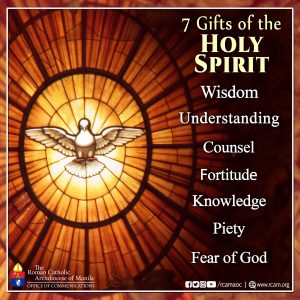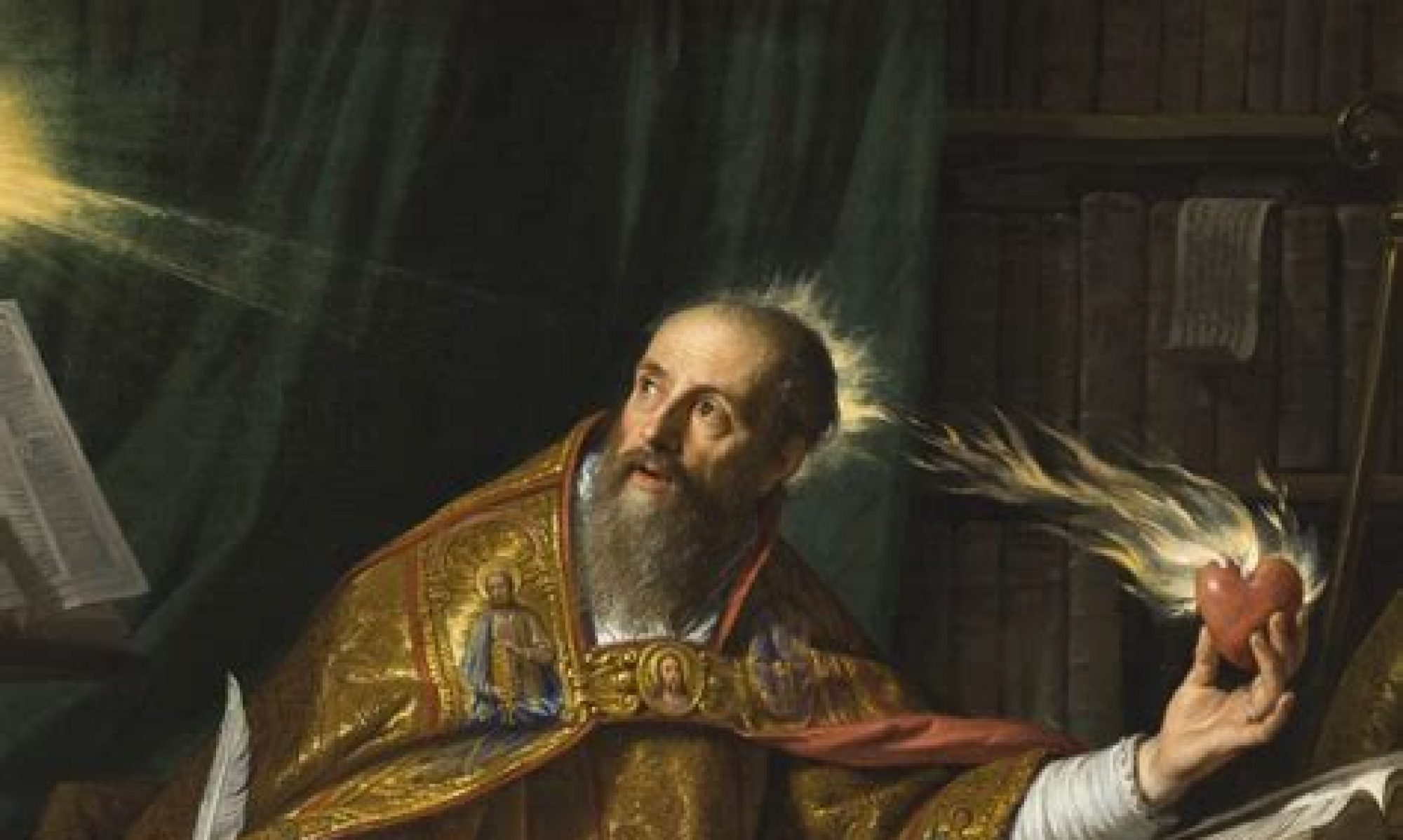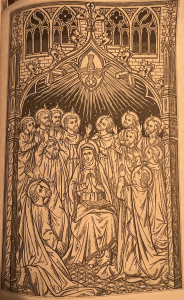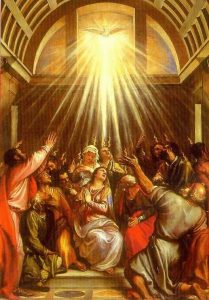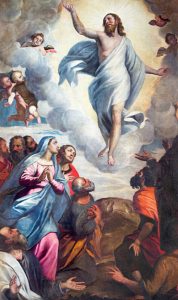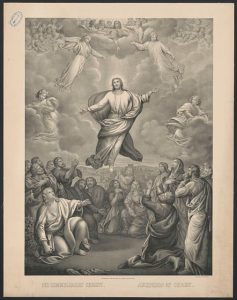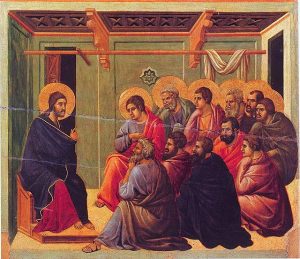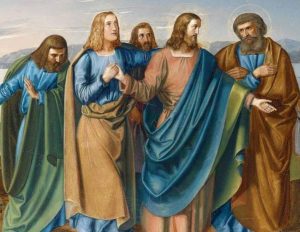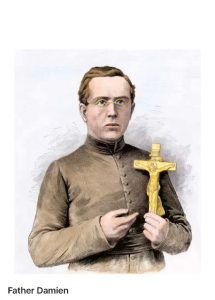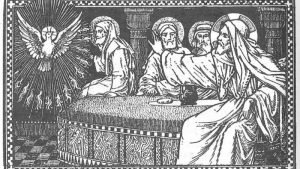Happy Pentecost Sunday! Veni Sancte Spiritus!!! Today is a joyful celebration focusing on the teaching of the Church concerning the third person in the Holy Trinity, which some Christian religious sects could hardly understand. One of these religious sects calls it “God’s force,” which they use to translate the name, Holy Spirit, in their bible. Some of these groups also use other terminologies that match their mind-set. It seems to go in circles with each view trying to confuse their followers, and they never listen, not getting it and not understanding what the Holy Spirit truly is.
Our father St. Augustine is one of the most important Fathers of the Church, who wrote substantial teachings on the Trinity and, of course, part of it is the Holy Spirit. It is our understanding that the Father, the Son, and the Holy Spirit are the three persons in one God. The Trinity acts as one divine unity. The Holy Spirit cannot be understood separately from the Father and the Son. Some Catholics make a separation of the three persons. Of course we can do that only in their works, but not in essence of the Oneness of God. St. Augustine emphasizes the Father as the Creator, the Son as the Redeemer and the Holy Spirit as the Wisdom, the giver of the knowledge of God.
Our first reading from the Acts of the Apostles 2:1-11 is a surprising event of “strong driving winds” and the appearance to the Apostles of a “tongue as of fire, which parted and came to rest in each one of them.” They would understand the many languages around them, of course with the help of the Holy Spirit in the understanding and finding about God in their midst. They were overjoyed with such an amazing event in which the Spirit rested more upon the Apostles and others around them. Through the Acts of the Apostles, we have known the mighty acts of God which present a new beginning of a bountiful harvest of believers on the day of Pentecost.
The second reading from the first letter of St. Paul to the Corinthians holds a wonderful physical image expressing the work of the Holy Spirit. It says, “There are different kinds of spiritual gifts but the same Spirit.” St. Paul makes an analogy about the Church having many different aspects like the human body which is guided by the Spirit. Moreover, the gifts of the Holy Spirit become the source of God’s power animating every part of the community and transforming the community into the body of Christ.
The gospel of John narrates the story about Jesus’ post-resurrection appearance. They were gathered inside the locked room in fear of the Jews. They had hid themselves, but despite the locked doors, Jesus appeared to them, greeted them with peace and breathed on them saying, “Receive the Holy Spirit.”
There are two actions, rendered by Jesus to His disciples, and we must take note seriously of the following:
First, Jesus offers them “Peace.” This is the gift of healing the disciples’ weak human condition. Jesus gifted them peace because of His disciples’ complacency and healed them to complete commitment and sense of fidelity. I do agree that “Peace” is a necessary gift they need to possess as a condition for His sending them because no one can proclaim God’s word if there is no inner peace! Every prolific preacher derives his effective preaching by means of being at peace with God, others, and himself.
Second, the breathing of the Holy Spirit. The breathing of the Spirit transforms the disciples’ whole-being from fear into courageous followers, then sends them to proclaim the gospel daringly and fearlessly. It is breathing new life into His followers and upon the earth. Our human fragility has been reinforced by the Holy Spirit to be strong and to gather fruitful harvest for God.
Brothers and Sisters, today is not simply a liturgical celebration of the Solemnity of Pentecost. It is our new birth within the Church. We are also gifted by God with peace and the Holy Spirit. At every mass Christ is exhorting to all of us, “Go in Peace.” Where are we being sent? To whom do we go to bring peace?
May we continue to be open to the Spirit, the Breath of God, the giver of courage, the one who overcomes our fear. God bless you.
Fr. Arlon, osa
— — —
El Dictado del Corazón
La Solemnidad de Pentecostés, año A
- Hechos 2:1-11
- Sal 104:1, 24, 29-30, 31, 34
- 1 Cor 12:3b-7, 12-13
- Jn 20:19-23
¡Feliz Domingo de Pentecostés! ¡¡¡Veni Sancte Spíritus!!! Hoy es una celebración de gozo, centrada en la enseñanza de la Iglesia sobre la tercera persona de la Santísima Trinidad, que algunas sectas religiosas cristianas difícilmente podían entender. Una de estas sectas religiosas lo llaman “la fuerza de Dios”, que usan para traducir el nombre, Espíritu Santo, en su biblia. Algunos de estos grupos también usan otras terminologías que coinciden con su forma de pensar. Parece ir en círculos con cada punto de vista tratando de confundir a sus seguidores, y ellos nunca escuchan, no lo entienden y no entienden lo que realmente es el Espíritu Santo.
Nuestro padre San Agustín es uno de los Padres más importantes de la Iglesia, quien escribió sustanciosas enseñanzas sobre la Trinidad y, por supuesto, parte de ella es el Espíritu Santo. Es nuestro entendimiento que el Padre, el Hijo y el Espíritu Santo son las tres personas en un solo Dios. La Trinidad actúa como una unidad divina. El Espíritu Santo no puede ser entendido separadamente del Padre y del Hijo. Algunos católicos hacen una separación de las trespersonas. Por supuesto, podemos hacer eso solo en sus obras, pero no en la esencia de la Unidad de Dios. San Agustín enfatiza al Padre como Creador, al Hijo como Redentor y al Espíritu Santo como Sabiduría, dador del conocimiento de Dios. San Agustín busca a Dios, manteniendo el corazón y la mente comprendiendo el misterio de Dios en su camino por la vida; sin embargo, no vemos la gran obra de San Agustín sin la ayuda del Espíritu Santo de la que nunca nos damos cuenta. Creo que buscar a Dios es nuestra meta a lograr aquí en la tierra, y para encontrarlo confiamos en el Espíritu Santo. Nadie conoce o ama las cosas de Dios sino recibiendo Su Espíritu.
Nuestra primera lectura de los Hechos de los Apóstoles 2:1-11 es un evento sorprendente de “fuertes vientos que soplan” y la aparición a los Apóstoles de una “lengua como de fuego, que se partió y se posó en cada uno de ellos. ” Entenderían los muchos idiomas que los rodeaban, por supuesto con la ayuda del Espíritu Santo en la comprensión y descubrimiento de Dios en medio de ellos. Se llenaron de alegría con un evento tan asombroso en el que el Espíritu descansó más sobre los Apóstoles y otros a su alrededor. A través de los Hechos de los Apóstoles, hemos conocido los hechos poderosos de Dios que presentan un nuevo comienzo de una abundante cosecha de creyentes en el día de Pentecostés.
La segunda lectura de la primera carta de San Pablo a los Corintios contiene una maravillosa imagen física que expresa la obra del Espíritu Santo. Dice: “Hay diferentes clases de dones espirituales pero el mismo Espíritu”. San Pablo hace una analogía acerca de que la Iglesia tiene muchos aspectos diferentes, como el cuerpo humano que es guiado por el Espíritu. Además, los dones del Espíritu Santo se convierten en la fuente del poder de Dios que anima cada parte de la comunidad y la transforma en el cuerpo de Cristo.
El evangelio de Juan narra la historia de la aparición de Jesús después de la resurrección. Estaban reunidos dentro de la habitación cerrada por temor a los judíos. Se habían escondido, pero a pesar de las puertas cerradas, Jesús se les apareció, los saludó con paz y sopló sobre ellos diciendo: “Reciban el Espíritu Santo”.
Hay dos acciones, dadas por Jesús a sus discípulos, y debemos tomar nota seriamente de lo siguiente:
Primero, Jesús les ofrece “Paz”. Este es el don de curar la débil condición humana de los discípulos. Jesús les regaló la paz debido a la complacencia de sus discípulos y los sanó para que tuvieran un compromiso completo y un sentido de fidelidad. ¡Estoy de acuerdo en que la “paz” es un don necesario que deben poseer como condición para que Él los envíe porque nadie puede proclamar la palabra de Dios si no hay paz interior! Todo predicador prolífico obtiene su predicación eficaz por medio de estar en paz con Dios, con los demás y consigo mismo.
Segundo, el soplo del Espíritu Santo. El soplo del Espíritu transforma todo el ser de los discípulos del miedo en seguidores valientes, luego los envía a proclamar el evangelio con audacia y sin miedo. Está dando nueva vida a Sus seguidores y sobre la tierra. Nuestra fragilidad humana ha sido reforzada por el Espíritu Santo para ser fuertes y recoger fructíferas cosechas para Dios.
Hermanos y hermanas, hoy no es simplemente una celebración litúrgica de la Solemnidad de Pentecostés. Es nuestro nuevo nacimiento dentro de la Iglesia. También estamos dotados por Dios con la paz y el Espíritu Santo. En cada misa, Cristo nos está exhortando a todos nosotros: “Pueden ir en paz”. ¿Adónde estamos siendo enviados? ¿A quién acudimos para traer la paz?
Que sigamos abiertos al Espíritu, el Soplo de Dios, el dador de coraje, el que vence nuestro miedo. Dios lo bendiga.
Padre Arlón, osa
